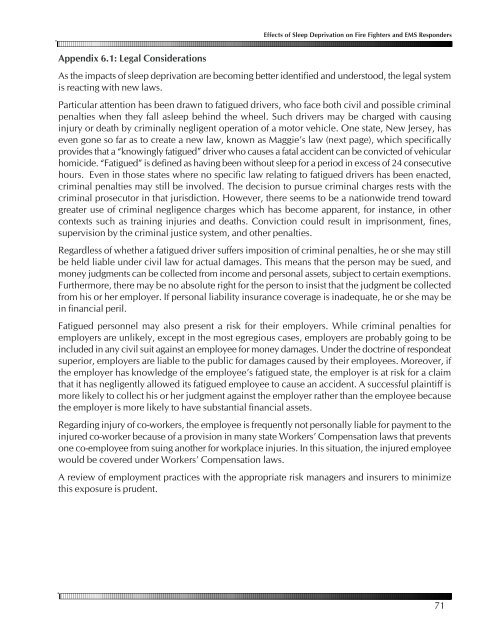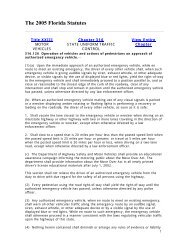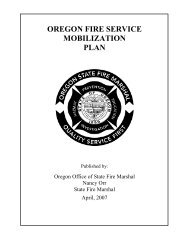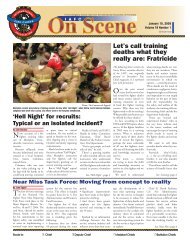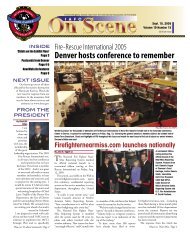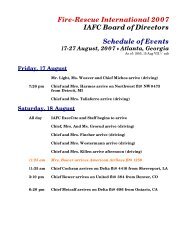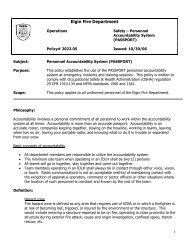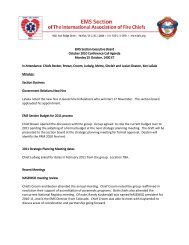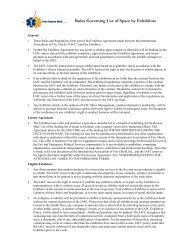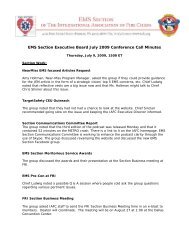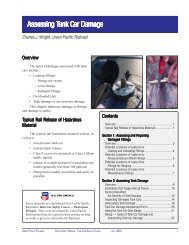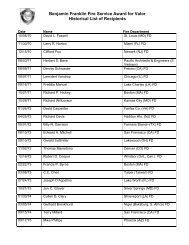Effects of Sleep Deprivation on Fire Fighters and EMS ... - NAEMT
Effects of Sleep Deprivation on Fire Fighters and EMS ... - NAEMT
Effects of Sleep Deprivation on Fire Fighters and EMS ... - NAEMT
You also want an ePaper? Increase the reach of your titles
YUMPU automatically turns print PDFs into web optimized ePapers that Google loves.
<str<strong>on</strong>g>Effects</str<strong>on</strong>g> <str<strong>on</strong>g>of</str<strong>on</strong>g> <str<strong>on</strong>g>Sleep</str<strong>on</strong>g> <str<strong>on</strong>g>Deprivati<strong>on</strong></str<strong>on</strong>g> <strong>on</strong> <strong>Fire</strong> <strong>Fighters</strong> <strong>and</strong> <strong>EMS</strong> Resp<strong>on</strong>ders<br />
Appendix 6.1: Legal C<strong>on</strong>siderati<strong>on</strong>s<br />
As the impacts <str<strong>on</strong>g>of</str<strong>on</strong>g> sleep deprivati<strong>on</strong> are becoming better identified <strong>and</strong> understood, the legal system<br />
is reacting with new laws.<br />
Particular attenti<strong>on</strong> has been drawn to fatigued drivers, who face both civil <strong>and</strong> possible criminal<br />
penalties when they fall asleep behind the wheel. Such drivers may be charged with causing<br />
injury or death by criminally negligent operati<strong>on</strong> <str<strong>on</strong>g>of</str<strong>on</strong>g> a motor vehicle. One state, New Jersey, has<br />
even g<strong>on</strong>e so far as to create a new law, known as Maggie’s law (next page), which specifically<br />
provides that a “knowingly fatigued” driver who causes a fatal accident can be c<strong>on</strong>victed <str<strong>on</strong>g>of</str<strong>on</strong>g> vehicular<br />
homicide. “Fatigued” is defined as having been without sleep for a period in excess <str<strong>on</strong>g>of</str<strong>on</strong>g> 24 c<strong>on</strong>secutive<br />
hours. Even in those states where no specific law relating to fatigued drivers has been enacted,<br />
criminal penalties may still be involved. The decisi<strong>on</strong> to pursue criminal charges rests with the<br />
criminal prosecutor in that jurisdicti<strong>on</strong>. However, there seems to be a nati<strong>on</strong>wide trend toward<br />
greater use <str<strong>on</strong>g>of</str<strong>on</strong>g> criminal negligence charges which has become apparent, for instance, in other<br />
c<strong>on</strong>texts such as training injuries <strong>and</strong> deaths. C<strong>on</strong>victi<strong>on</strong> could result in impris<strong>on</strong>ment, fines,<br />
supervisi<strong>on</strong> by the criminal justice system, <strong>and</strong> other penalties.<br />
Regardless <str<strong>on</strong>g>of</str<strong>on</strong>g> whether a fatigued driver suffers impositi<strong>on</strong> <str<strong>on</strong>g>of</str<strong>on</strong>g> criminal penalties, he or she may still<br />
be held liable under civil law for actual damages. This means that the pers<strong>on</strong> may be sued, <strong>and</strong><br />
m<strong>on</strong>ey judgments can be collected from income <strong>and</strong> pers<strong>on</strong>al assets, subject to certain exempti<strong>on</strong>s.<br />
Furthermore, there may be no absolute right for the pers<strong>on</strong> to insist that the judgment be collected<br />
from his or her employer. If pers<strong>on</strong>al liability insurance coverage is inadequate, he or she may be<br />
in financial peril.<br />
Fatigued pers<strong>on</strong>nel may also present a risk for their employers. While criminal penalties for<br />
employers are unlikely, except in the most egregious cases, employers are probably going to be<br />
included in any civil suit against an employee for m<strong>on</strong>ey damages. Under the doctrine <str<strong>on</strong>g>of</str<strong>on</strong>g> resp<strong>on</strong>deat<br />
superior, employers are liable to the public for damages caused by their employees. Moreover, if<br />
the employer has knowledge <str<strong>on</strong>g>of</str<strong>on</strong>g> the employee’s fatigued state, the employer is at risk for a claim<br />
that it has negligently allowed its fatigued employee to cause an accident. A successful plaintiff is<br />
more likely to collect his or her judgment against the employer rather than the employee because<br />
the employer is more likely to have substantial financial assets.<br />
Regarding injury <str<strong>on</strong>g>of</str<strong>on</strong>g> co-workers, the employee is frequently not pers<strong>on</strong>ally liable for payment to the<br />
injured co-worker because <str<strong>on</strong>g>of</str<strong>on</strong>g> a provisi<strong>on</strong> in many state Workers’ Compensati<strong>on</strong> laws that prevents<br />
<strong>on</strong>e co-employee from suing another for workplace injuries. In this situati<strong>on</strong>, the injured employee<br />
would be covered under Workers’ Compensati<strong>on</strong> laws.<br />
A review <str<strong>on</strong>g>of</str<strong>on</strong>g> employment practices with the appropriate risk managers <strong>and</strong> insurers to minimize<br />
this exposure is prudent.<br />
71


